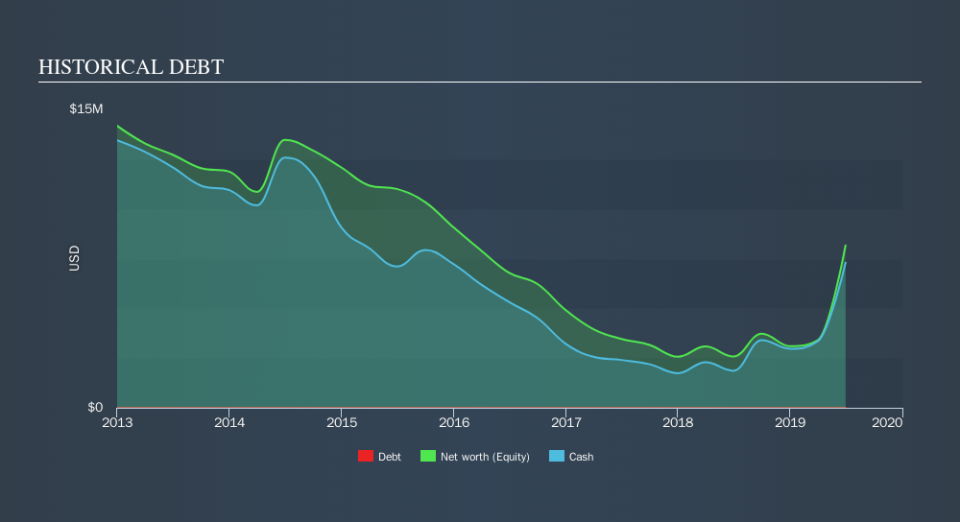Here's Why We're Not Too Worried About Research Frontiers's (NASDAQ:REFR) Cash Burn Situation

Even when a business is losing money, it's possible for shareholders to make money if they buy a good business at the right price. For example, although software-as-a-service business Salesforce.com lost money for years while it grew recurring revenue, if you held shares since 2005, you'd have done very well indeed. But while history lauds those rare successes, those that fail are often forgotten; who remembers Pets.com?
So should Research Frontiers (NASDAQ:REFR) shareholders be worried about its cash burn? In this report, we will consider the company's annual negative free cash flow, henceforth referring to it as the 'cash burn'. We'll start by comparing its cash burn with its cash reserves in order to calculate its cash runway.
See our latest analysis for Research Frontiers
Does Research Frontiers Have A Long Cash Runway?
You can calculate a company's cash runway by dividing the amount of cash it has by the rate at which it is spending that cash. When Research Frontiers last reported its balance sheet in June 2019, it had zero debt and cash worth US$7.3m. Looking at the last year, the company burnt through US$2.3m. So it had a cash runway of about 3.1 years from June 2019. There's no doubt that this is a reassuringly long runway. The image below shows how its cash balance has been changing over the last few years.
How Well Is Research Frontiers Growing?
At first glance it's a bit worrying to see that Research Frontiers actually boosted its cash burn by 30%, year on year. And we must say we find it concerning that operating revenue dropped 5.0% over the same period. Considering both these metrics, we're a little concerned about how the company is developing. In reality, this article only makes a short study of the company's growth data. This graph of historic earnings and revenue shows how Research Frontiers is building its business over time.
Can Research Frontiers Raise More Cash Easily?
Even though it seems like Research Frontiers is developing its business nicely, we still like to consider how easily it could raise more money to accelerate growth. Companies can raise capital through either debt or equity. Many companies end up issuing new shares to fund future growth. We can compare a company's cash burn to its market capitalisation to get a sense for how many new shares a company would have to issue to fund one year's operations.
Since it has a market capitalisation of US$95m, Research Frontiers's US$2.3m in cash burn equates to about 2.4% of its market value. That means it could easily issue a few shares to fund more growth, and might well be in a position to borrow cheaply.
Is Research Frontiers's Cash Burn A Worry?
It may already be apparent to you that we're relatively comfortable with the way Research Frontiers is burning through its cash. In particular, we think its cash runway stands out as evidence that the company is well on top of its spending. Although its increasing cash burn does give us reason for pause, the other metrics we discussed in this article form a positive picture overall. Considering all the factors discussed in this article, we're not overly concerned about the company's cash burn, although we do think shareholders should keep an eye on how it develops. While it's important to consider hard data like the metrics discussed above, many investors would also be interested to note that Research Frontiers insiders have been trading shares in the company. Click here to find out if they have been buying or selling.
Of course, you might find a fantastic investment by looking elsewhere. So take a peek at this free list of interesting companies, and this list of stocks growth stocks (according to analyst forecasts)
We aim to bring you long-term focused research analysis driven by fundamental data. Note that our analysis may not factor in the latest price-sensitive company announcements or qualitative material.
If you spot an error that warrants correction, please contact the editor at editorial-team@simplywallst.com. This article by Simply Wall St is general in nature. It does not constitute a recommendation to buy or sell any stock, and does not take account of your objectives, or your financial situation. Simply Wall St has no position in the stocks mentioned. Thank you for reading.

